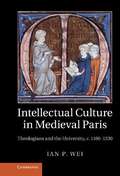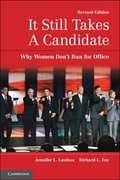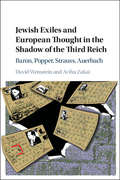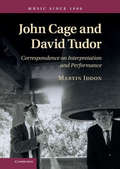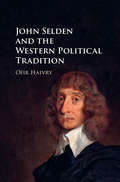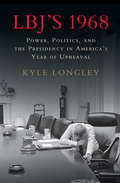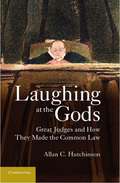- Table View
- List View
Hamilton versus Jefferson in the Washington Administration
by Carson HollowayBy the middle of 1792, just a little more than three years after America's new government under the Constitution had been set in motion, Alexander Hamilton and Thomas Jefferson - President George Washington's two most important cabinet secretaries and two of the most eminent men among the American founders - had become open and bitter political enemies. Their dispute was not personal but political in the highest sense. Each believed that the debate between them was over regime principles. Each believed that he was protecting the newly established republic, and that the other was laboring to destroy it. Carson Holloway's Hamilton versus Jefferson in the Washington Administration examines Hamilton and Jefferson's differences, seeking to explain why these great founders came to disagree so profoundly and vehemently about the political project to which both were committed and had dedicated so much thought and effort.
Heinrich Glarean's Books
by Iain Fenlon Inga Mai GrooteThis collection of essays investigates the work of Heinrich Glarean, one of the most influential humanists and music theorists of the sixteenth century. For the first time, Glarean's musical writings, including his masterwork the Dodekachordon, are considered in the wider context of his work in a variety of disciplines such as musicology, history, theology and geography. Contributors reference books from Glarean's private library, including rare and previously unseen material, to explore his strategies and impact as a humanist author and university teacher. The book also uses other newly discovered source material such as course notes written by students and Glarean's preparations for his own lectures to offer a fascinating picture of his reactions to contemporary debates. Providing a detailed analysis of Glarean's library as reconstructed from the surviving copies, Heinrich Glarean's Books offers new and exciting perspectives on the multi-disciplinary work of an accomplished intellectual.
Hi Hitler!
by Gavriel D. RosenfeldThe Third Reich's legacy is in flux. For much of the post-war period, the Nazi era has been viewed moralistically as an exceptional period of history intrinsically different from all others. Since the turn of the millennium, however, this view has been challenged by a powerful wave of normalization. Gavriel D. Rosenfeld charts this important international trend by examining the shifting representation of the Nazi past in contemporary western intellectual and cultural life. Focusing on works of historical scholarship, popular novels, counterfactual histories, feature films, and Internet websites, he identifies notable changes in the depiction of the Second World War, the Holocaust, and the figure of Adolf Hitler himself. By exploring the origins of these works and assessing the controversies they have sparked in the United States and Europe, Hi Hitler! offers a fascinating and timely analysis of the shifting status of the Nazi past in western memory.
Hildegard of Bingen and Musical Reception
by Jennifer BainSince her death in 1179, Hildegard of Bingen has commanded attention in every century. In this book Jennifer Bain traces the historical reception of Hildegard, focusing particularly on the moment in the modern era when she began to be considered as a composer. Bain examines how the activities of clergy in nineteenth-century Eibingen resulted in increased veneration of Hildegard, an authentication of her relics, and a rediscovery of her music. The book goes on to situate the emergence of Hildegard's music both within the French chant restoration movement driven by Solesmes and the German chant revival supported by Cecilianism, the German movement to reform Church music more generally. Engaging with the complex political and religious environment in German speaking areas, Bain places the more recent Anglophone revival of Hildegard's music in a broader historical perspective and reveals the important intersections amongst local devotion, popular culture, and intellectual activities.
Hitler versus Hindenburg
by Larry Eugene JonesHitler versus Hindenburg provides the first in-depth study of the titanic struggle between the two most dominant figures on the German Right in the last year before the establishment of the Third Reich. Although Hindenburg was reelected as Reich president by a comfortable margin, his authority was severely weakened by the fact that the vast majority of those who had supported his candidacy seven years earlier had switched their support to Hitler in 1932. What the two candidates shared in common, however, was that they both relied upon charisma to legitimate their claim to the leadership of the German nation. The increasing reliance upon charisma in the 1932 presidential elections greatly accelerated the delegitimation of the Weimar Republic and set the stage for Hitler's appointment as chancellor nine months later.
Hume
by James A. HarrisThis is the first book to provide a comprehensive overview of the entire career of one of Britain's greatest men of letters. It sets in biographical and historical context all of Hume's works, from A Treatise of Human Nature to The History of England, bringing to light the major influences on the course of Hume's intellectual development, and paying careful attention to the differences between the wide variety of literary genres with which Hume experimented. The major events in Hume's life are fully described, but the main focus is on Hume's intentions as a philosophical analyst of human nature, politics, commerce, English history, and religion. Careful attention is paid to Hume's intellectual relations with his contemporaries. The goal is to reveal Hume as a man intensely concerned with the realization of an ideal of open-minded, objective, rigorous, dispassionate dialogue about all the principal questions faced by his age.
I Freed Myself
by David WilliamsFor a century and a half, Abraham Lincoln's signing of the Emancipation Proclamation has been the dominant narrative of African American freedom in the Civil War era. However, David Williams suggests that this portrayal marginalizes the role that African American slaves played in freeing themselves. At the Civil War's outset, Lincoln made clear his intent was to save the Union rather than free slaves - despite his personal distaste for slavery, he claimed no authority to interfere with the institution. By the second year of the war, though, when the Union army was in desperate need of black support, former slaves who escaped to Union lines struck a bargain: they would fight for the Union only if they were granted their freedom. Williams importantly demonstrates that freedom was not simply the absence of slavery but rather a dynamic process enacted by self-emancipated African American refugees, which compelled Lincoln to modify his war aims and place black freedom at the center of his wartime policies.
Inside African Anthropology
by Andrew Bank Leslie J. BankInside African Anthropology offers an incisive biography of the life and work of South Africa's foremost social anthropologist, Monica Hunter Wilson. By exploring her main fieldwork and intellectual projects in southern Africa between the 1920s and 1960s, the book offers insights into her personal and intellectual life. Beginning with her origins in the remote Eastern Cape, the authors follow Wilson to the University of Cambridge and back into the field among the Mpondo of South Africa, where her studies resulted in her 1936 book Reaction to Conquest. Her fieldwork focus then shifted to Tanzania, where she teamed up with her husband, Godfrey Wilson. In the 1960s, Wilson embarked on a new urban ethnography with a young South African anthropologist, Archie Mafeje, one of the many black scholars she trained. This study also provides a meticulously researched exploration of the indispensable contributions of African research assistants to the production of this famous woman scholar's cultural knowledge about mid-twentieth-century Africa.
Intellectual Culture in Medieval Paris
by Ian P. WeiIn the thirteenth century, the University of Paris emerged as a complex community with a distinctive role in society. This book explores the relationship between contexts of learning and the ways of knowing developed within them, focusing on twelfth-century schools and monasteries, as well as the university. By investigating their views on money, marriage and sex, Ian Wei reveals the complexity of what theologians had to say about the world around them. He analyses the theologians' sense of responsibility to the rest of society and the means by which they tried to communicate and assert their authority. In the late thirteenth and early fourteenth centuries, however, their claims to authority were challenged by learned and intellectually sophisticated women and men who were active outside as well as inside the university and who used the vernacular – an important phenomenon in the development of the intellectual culture of medieval Europe.
Intellectuals and the Search for National Identity in Twentieth-Century Brazil
by Ronald H. ChilcoteThis book discusses twentieth-century Brazilian political thought, arguing that while Rio de Janeiro intellectuals envisaged the state and the national bourgeoisie as the means to overcome dependency on foreign ideas and culture, São Paulo intellectuals looked to civil society and the establishment of new academic institutions in the search for national identity. Ronald H. Chilcote begins his study by outlining Brazilian intellectuals' attempt to transcend a sense of inferiority emanating from Brazilian colonialism and backwardness. Next, he traces the struggle for national identity in Rio de Janeiro through an account of how intellectuals of varying political persuasions united in search of a political ideology of national development. He then presents an analysis by São Paulo intellectuals on racial discrimination, social inequality, and class differentiation under early capitalism and industrialization. Lastly, the book concludes with a discussion on how Brazilian intellectuals challenged foreign thinking about development through the state and representative democratic institutions, in contrast to popular and participatory democratic practices.
Interpreting Newton
by Andrew Janiak Eric SchliesserThis collection of specially commissioned essays by leading scholars presents new research on Isaac Newton and his main philosophical interlocutors and critics. The essays analyze Newton's relation to his contemporaries, especially Barrow, Descartes, Leibniz and Locke and discuss the ways in which a broad range of figures, including Hume, Maclaurin, Maupertuis and Kant, reacted to his thought. The wide range of topics discussed includes the laws of nature, the notion of force, the relation of mathematics to nature, Newton's argument for universal gravitation, his attitude toward philosophical empiricism, his use of 'fluxions', his approach toward measurement problems and his concept of absolute motion, together with new interpretations of Newton's matter theory. The volume concludes with an extended essay that analyzes the changes in physics wrought by Newton's Principia. A substantial introduction and bibliography provide essential reference guides.
Is Bipartisanship Dead?
by Laurel HarbridgeIs Bipartisanship Dead? looks beyond (and considers the time before) roll call voting to examine the extent to which bipartisan agreement in the House of Representatives has declined since the 1970s. Despite voting coalitions showing a decline in bipartisan agreement between 1973 and 2004, member's bill cosponsorship coalitions show a much more stable level of bipartisanship. The declining bipartisanship over time in roll call voting reflects a shift in how party leaders structure the floor and roll call agendas. Party leaders in the House changed from prioritizing legislation with bipartisan agreement in the 1970s to prioritizing legislation with partisan disagreement by the 1990s. Laurel Harbridge argues that this shift reflects a changing political environment and an effort by leaders to balance members' electoral interests, governance goals, and partisan differentiation. The findings speak to questions of representation and governance. They also shed light on whether partisan conflict is insurmountable, and, ultimately, whether bipartisanship in congressional politics is dead.
Islamic Intellectual History in the Seventeenth Century
by Khaled El-RouayhebFor much of the twentieth century, the intellectual life of the Ottoman and Arabic-Islamic world in the seventeenth century was ignored or mischaracterized by historians. Ottomanists typically saw the seventeenth century as marking the end of Ottoman cultural florescence, while modern Arab nationalist historians tended to see it as yet another century of intellectual darkness under Ottoman rule. This book is the first sustained effort at investigating some of the intellectual currents among Ottoman and North African scholars of the early modern period. Examining the intellectual production of the ranks of learned ulema (scholars) through close readings of various treatises, commentaries, and marginalia, Khaled El-Rouayheb argues for a more textured - and text-centered - understanding of the vibrant exchange of ideas and transmission of knowledge across a vast expanse of Ottoman-controlled territory.
It Still Takes A Candidate
by Jennifer L. Lawless Richard L. FoxIt Still Takes a Candidate serves as the only systematic, nationwide empirical account of the manner in which gender affects political ambition. Based on data from the Citizen Political Ambition Panel Study, a national survey conducted of almost 3,800 "potential candidates" in 2001 and a second survey of more than 2,000 of these same individuals in 2008, Jennifer L. Lawless and Richard L. Fox find that women, even in the highest tiers of professional accomplishment, are substantially less likely than men to demonstrate ambition to seek elective office. Women are less likely than men to be recruited to run for office. They are less likely than men to think they are qualified to run for office. And they are less likely than men to express a willingness to run for office in the future. This gender gap in political ambition persists across generations and over time. Despite cultural evolution and society's changing attitudes toward women in politics, running for public office remains a much less attractive and feasible endeavor for women than men.
Jack Tar's Story: The Autobiographies and Memoirs of Sailors in Antebellum America
by Myra C. GlennJack Tar's Story examines the autobiographies and memoirs of antebellum American sailors to explore contested meanings of manhood and nationalism in the early republic. It is the first study to use various kinds of institutional sources, including crew lists, ships' logs, impressment records, to document the stories sailors told. It focuses on how mariner authors remembered/interpreted various events and experiences, including the War of 1812, the Haitian Revolution, South America's wars of independence, British impressment, flogging on the high seas, roistering, and religious conversion. This book straddles different fields of scholarship and suggests how their concerns intersect or resonate with each other: the history of print culture, the study of autobiographical writing, and the historiography of seafaring life and of masculinity in antebellum America.
James Madison and Constitutional Imperfection
by Jeremy D. BaileyThis book presents a provocative account of James Madison's political thought by focusing on Madison's lifelong encounter with the enduring problem of constitutional imperfection. In particular, it emphasizes Madison's alliance with Thomas Jefferson, liberating it from those long-standing accounts of Madisonian constitutionalism that emphasize deliberation by elites and constitutional veneration. Contrary to much of the scholarship, this book shows that Madison was aware of the limits of the inventions of political science and held a far more subtle understanding of the possibility of constitutional government than has been recognized. By repositioning Madison as closer to Jefferson and the Revolution of 1800, this book offers a reinterpretation of one of the central figures of the early republic.
Jewish Exiles and European Thought in the Shadow of the Third Reich: Baron, Popper, Strauss, Auerbach
by Avihu Zakai David WeinsteinHans Baron, Karl Popper, Leo Strauss and Erich Auerbach were among the many German-speaking Jewish intellectuals who fled Continental Europe with the rise of Nazism in the 1930s. Their scholarship, though not normally considered together, is studied here to demonstrate how, despite their different disciplines and distinctive modes of working, they responded polemically in the guise of traditional scholarship to their shared trauma. For each, the political calamity of European fascism was a profound intellectual crisis, requiring an intellectual response which Weinstein and Zakai now contextualize, ideologically and politically. They exemplify just how extensively, and sometimes how subtly, 1930s and 1940s scholarship was used not only to explain, but to fight the political evils that had infected modernity, victimizing so many. An original perspective on a popular area of research, this book draws upon a mass of secondary literature to provide an innovative and valuable contribution to twentieth-century intellectual history.
Jewish Radical Ultra-Orthodoxy Confronts Modernity, Zionism and Women’s Equality
by Motti Inbari Inbari, Motti and Vardi, Shaul Shaul VardiIn Jewish Radical Ultra-Orthodoxy Confronts Modernity, Zionism and Women's Equality, Motti Inbari undertakes a study of the culture and leadership of Jewish radical ultra-Orthodoxy in Hungary, Jerusalem and New York. He reviews the history, ideology and gender relations of prominent ultra-Orthodox leaders Amram Blau (1894–1974), founder of the anti-Zionist Jerusalemite Neturei Karta, and Yoel Teitelbaum (1887–1979), head of the Satmar Hasidic movement in New York. Focussing on the rabbis' biographies, the author analyzes their enclave building methods, their attitude to women and modesty, and their eschatological perspectives. The research is based on newly discovered archival materials, covering many unique and remarkable findings. The author concludes with a discussion of contemporary trends in Jewish religious radicalization. Inbari highlights the resilience of the current generations' sense of community cohesion and their capacity to adapt and overcome challenges such as rehabilitation into potentially hostile secular societies.
John Cage and David Tudor
by Martin IddonJohn Cage is best known for his indeterminate music, which leaves a significant level of creative decision-making in the hands of the performer. But how much licence did Cage allow? Martin Iddon's book is the first volume to collect the complete extant correspondence between the composer and pianist David Tudor, one of Cage's most provocative and significant musical collaborators. The book presents their partnership from working together in New York in the early 1950s, through periods on tour in Europe, until the late stages of their work from the 1960s onwards, carried out almost exclusively within the frame of the Merce Cunningham Dance Company. Tackling the question of how much creative flexibility Tudor was granted, Iddon includes detailed examples of the ways in which Tudor realised Cage's work, especially focusing on Music of Changes to Variations II, to show how composer and pianist influenced one another's methods and styles.
John Selden and the Western Political Tradition
by Ofir HaivryLegal and political theorist, common lawyer and parliamentary leader, historian and polyglot, John Selden (1584-1654) was a formidable figure in Renaissance England, whose real importance and influence are now being recognized once again. John Selden and the Western Political Tradition highlights his important role in the development of such early modern political ideas as modern natural law and natural rights, national identity and tradition, the political integration of church and state, and the effect of Jewish ideas on Western political thought. Selden's political ideas are analysed in the context of his contemporaries Grotius, Hobbes and Filmer. The book demonstrates how these ideas informed and influenced more familiar works of later thinkers like Burke.
Kant: A Biography
by Manfred KuehnThis is the first full-length biography in more than fifty years of Immanuel Kant, one of the giants among the pantheon of Western philosophers, and one of the most powerful and influential in contemporary philosophy. Taking account of the most recent scholarship, Manfred Kuehn allows the reader to follow the same journey that Kant himself took in emerging as a central figure in modern philosophy. Manfred Kuehn was formerly Professor of Philosophy at Purdue University. A specialist on German philosophy of the period, he is the author of numerous articles and papers on Immanuel Kant.
King James VI and I and the Reunion of Christendom
by W. B. PattersonThis is a historical study of the career of King James VI and I, as king of Scotland (1567-1625) and England (1603-1625), who achieved a union of the crowns as the first king of Great Britain, and who undertook to end the recurring religious wars. His peacemaking by diplomatic means was complemented by his efforts to foster closer relations among the churches. The peace that he helped to maintain by these initiatives, though cut short by the coming of the Thirty Years' War, was immensely beneficial both to Britain and to the other countries of Europe.
LBJ’s 1968: Power, Politics, and the Presidency in America's Year of Upheaval
by Kyle Longley1968 was an unprecedented year in terms of upheaval on numerous scales: political, military, economic, social, cultural. In the United States, perhaps no one was more undone by the events of 1968 than President Lyndon Baines Johnson. <P><P>Kyle Longley leads his readers on a behind-the-scenes tour of what Johnson characterized as the 'year of a continuous nightmare'. Longley explores how LBJ perceived the most significant events of 1968, including the Vietnam War, the assassinations of Martin Luther King, Jr and Robert Kennedy, and the violent Democratic National Convention in Chicago. His responses to the crises were sometimes effective but often tragic, and LBJ's refusal to seek re-election underscores his recognition of the challenges facing the country in 1968. As much a biography of a single year as it is of LBJ, LBJ's 1968 vividly captures the tumult that dominated the headlines on a local and global level. Analyzes the crisis management style of a President; Features modern continuities in policymaking and political discourse, providing readers with a better understanding of the ongoing debates in today's political sphere; Highlights the challenges facing a president after five years of almost non-stop change and a rising conservative backlash.
Latino Representation in State Houses and Congress
by Jason P. CasellasThis book argues that Latino representation in U. S. legislative institutions is shaped not only by demographics but by legislative institutional design, as well as elite-driven methods, features of the electoral system, and the increasing mainstreaming of Latinos in American society. The election of Latino legislators in the United States is thus complex and varied. This book provides evidence on how successful Latinos have been in winning state legislative and congressional districts in which they have no natural advantage. In particular, this book demonstrates that Latino candidates benefit from higher percentages of Latino citizens in the state, more liberal citizenries, and citizen legislatures. Jason Casellas argues that the legislatures most conducive to the election of Latino candidates are Florida, New Mexico, and California, whereas the least conducive are the U. S. House and New York.
Laughing at the Gods
by Allan C. HutchinsonAny effort to understand how law works has to take seriously its main players – judges. Like any performance, judging should be evaluated by reference to those who are its best exponents. Not surprisingly, the debate about what makes a 'great judge' is as heated and inconclusive as the debate about the purpose and nature of law itself. History shows that those who are candidates for a judicial hall of fame are game changers who oblige us to rethink what it is to be a good judge. So the best of judges must tread a thin line between modesty and hubris; they must be neither mere umpires nor demigods. The eight judges showcased in this book demonstrate that, if the test of good judging is not about getting it right, but doing it well, then the measure of great judging is about setting new standards for what counts as judging well.

